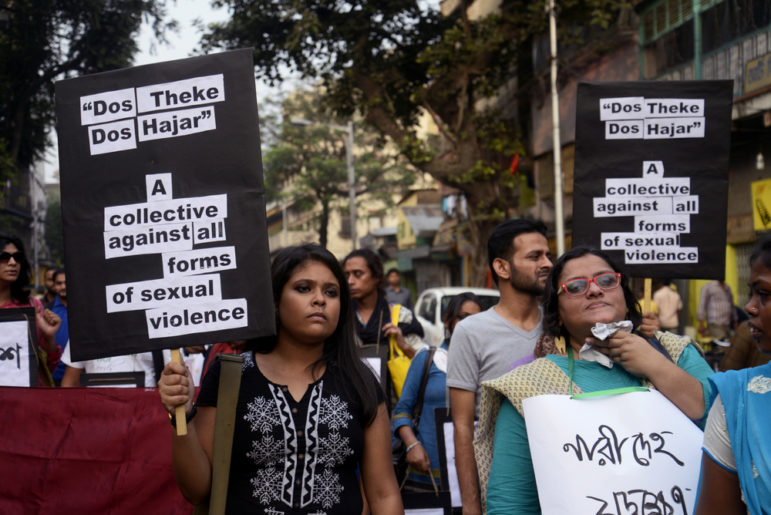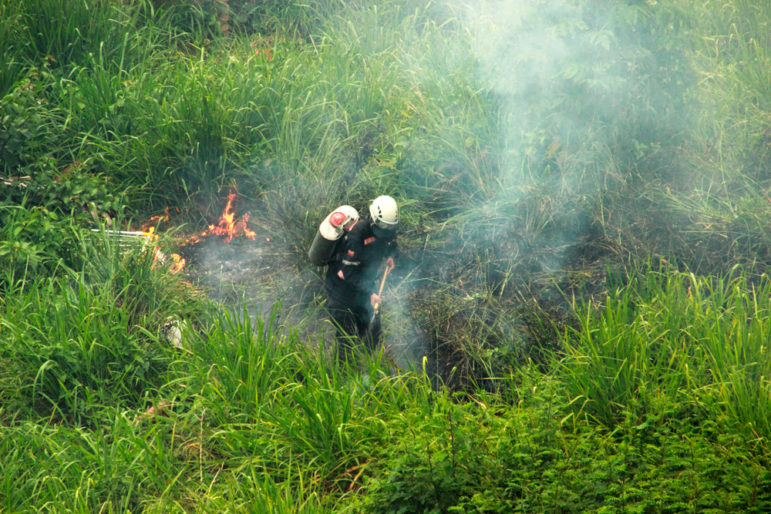

Tips from the Pros: Investigating Raw Materials Traders in Switzerland
Read this article in

Crude oil being transported. Journalists can track what’s inside these ships through bills of lading. Image: Shutterstock
A haven of banking secrecy for decades, Switzerland has now become a land of raw materials trading. Most of the private hydrocarbon trading giants have set up their headquarters in Geneva. Alongside them are the thousands of small and medium-sized companies in the sector that work more or less in the shadows, appearing and disappearing as circumstances require.
At Public Eye, part of our work involves investigating the work of these companies in developing countries.
Unlike banks, which have to comply with international standards on money laundering and tax fraud – and whose activities are monitored by a supervisory body in Switzerland (FINMA) – these trading companies operate without comparable accountability. Over the past few years, several resounding scandals have revealed dubious practices in the industry, from corruption and human rights violations to the devastation of the environment.
Reports from Traders
So there is a good reason to investigate. But how to proceed in a sector largely dominated by opacity and omertà? Apart from the need for informers – and yes, some naturally curious or vengeful traders like being in contact with journalists – there is no shortage of sources. These can allow you to uncover a few gems.
Although trading companies are not bound by any duty of due diligence, they do issue governance or social responsibility reports every year. Do not under any circumstances fall for their pacifying statements on “sustainable development,” or phrases like “zero tolerance for corruption.” Instead, read their glossy paper brochures carefully. They contain information on mining sites, the number of mining accidents, their carbon footprint, and their expenditure on community projects.
When a Swiss trading house is listed on the stock exchange in London, it is required to publish a certain degree of information on its finances and its activities. Proceed with caution, however: unlike financial reports, these sustainability reports are not audited. At best, they are revised by one of the Big Four firms — the world’s largest four financial audit groups.
But sometimes these reports are more interesting for what they do not reveal. For example, one multinational decided not to include in its latest sustainability report an incident that took place in a cobalt mine in the Democratic Republic of Congo on the basis that the 39 miners killed were not its direct employees.
Transparency on a Voluntary — and Incomplete — Basis
In recent years, some trading companies concerned about their image have disclosed a portion of the payments that they make to governments. Their responsibility reports contain details of the payments made to national oil companies and state-owned companies. This transparency applies only to member countries of the Extractive Industries Transparency Initiative (EITI), a 55-country initiative to create a global standard for the good governance of oil, gas, and mineral resources. But as journalists, you can at least compare the amounts received by states and declared in EITI reports on the one hand with the amounts paid by traders on the other. Any discrepancies should attract your attention.
For countries that are not members of EITI – which are highly problematic in terms of corruption, such as South Sudan, Equatorial Guinea, Azerbaijan, and Russia – a multinational corporation will, for example, be able to publish nothing more than aggregated data on payments without giving any details, which is difficult to use. For example, one major trader details that it has paid $20.6 billion to EITI member countries since 2013, a figure dwarfed by the $113.6 billion it has paid to non-member states.
Official Registers
Trade registers which disclose figures from firms based in a certain area, or canton — as Swiss administration regions are known — also provide important information on companies’ trading names, subsidiaries, and changes over time, such as change of address, liquidation, and management team. You can find this information on the Zefix.ch website, which allows you to search by company name. For identifying individuals, shabex.ch is recommended.
Switzerland, like many other countries, has no register listing the actual owners of companies or the ultimate beneficial owners, and, in trading, the shadiest negotiations often take place via an intermediary with no apparent connection to the sector.
There is nonetheless a solution, and it is linked to the very essence of these multinationals. They have subsidiaries in multiple corners of the world, and leave tracks in a number of registers. The registers in the Netherlands (solely in Dutch), UK, Malta, Luxembourg, and Singapore are much more generous with the information they provide — covering loans, subsidiaries, joint ventures, and market shares — than their Swiss equivalent.
The Rolls Royce of commercial databases remains the most difficult one to obtain. When traders raise funds from banks through syndicated loans or bond issues, they are required to publish prospectuses running to several hundred pages that set out essential information on how their business is performing. This data is not public, but it can be obtained from your banking contacts or from a colleague specializing in the sector.
Legal Documents
The Federal Criminal Court of Switzerland (TPF), based in Bellinzona, Ticino, has a database that is worth using. Although the identities of persons and companies are redacted in the judgments issued, it is often possible to piece the story together, thanks to the precise description of the facts and because the parties’ counsel are named.
Journalists based in Switzerland can become accredited with the TPF. They will then receive or be able to consult indictments, judgments, and penalty orders without any censorship. In this manner, reporters were able to get unfiltered access to essential court documents in a corruption scandal involving the oil markets in Congo-Brazzaville and Ivory Coast.
Another useful tool: PACER, the US website that gives access to over one billion archived documents from US federal courts, including criminal, civil, and appeal proceedings. You have to pay for access, but the prices are reasonable. The service contains documents concerning the giants in the raw materials trade, and the Court Listener website will let you view some of these documents free of charge.
We should also mention the online media resource Gotham City, which, every week, analyzes court documents and offers one of the finest reviews of economic crime in Switzerland. Trading companies are leading players in this field.
Tracking Merchant Vessels
The pay-for-access website Panjiva provides data on global trade, including bills of lading. Bills of lading are documents that formalize the transport contract drawn up between a loader and a carrier and contain valuable information such as the origin of an oil shipment, its quality and quantity, and its destination port.
These documents can be decisive in certain investigations, such as into the contraband sale of oil products from Libya — see this investigation by Public Eye and Trial International — allowing journalists to track certain ships by aggregating the data provided by the Automatic Identification System, or AIS. This automated system for exchanging very high-frequency radio messages between ships can be used to determine the identity, status, position, and route of ships within the navigation area.
It is specialized work, and some NGOs, such as C4ADS in the US, have focused on analyzing this complex data. Another option is to use websites like Marine Traffic or Vessel Tracker, which offer some services free of charge.
Expertise at NGOs
In conclusion, we should add that certain investigative NGOs – including Global Witness and, yours truly, Public Eye – have acquired particular expertise over the years in the raw materials trading sector, and have compiled extensive archives in their internal wikis. Please feel free to contact us.
This article was originally written in French as part of the “Conseils de Pros,” or “Tips from the Pros” column published by GIJN en français. You can read the original here. This translation is by Keith Geaney.
Additional Resources
Follow the Money: How Open Data and Investigative Journalism Can Beat Corruption
GIJN Resource Center: Researching Corporations and Their Owners
How to Follow the Money: Tips for Cross-border Investigations
 Adrià Budry Carbó is a journalist-investigator at the Swiss NGO Public Eye, working in the raw materials department. He has worked at the Geneva Tribunal, and for five years at the newspaper Le Temps. He is co-winner of the 2019 Acanu Prize for his report “Trapped on the High Seas.”
Adrià Budry Carbó is a journalist-investigator at the Swiss NGO Public Eye, working in the raw materials department. He has worked at the Geneva Tribunal, and for five years at the newspaper Le Temps. He is co-winner of the 2019 Acanu Prize for his report “Trapped on the High Seas.”
 Agathe Duparc is a journalist with Public Eye, and a specialist on Russia and economic crime. She has reported for Le Monde and Mediapart. Since 2018, she has worked on investigating the raw materials trade. She is the co-author of “Gunvor in Congo: The Adventures of a Geneva Merchant in Brazzaville.”
Agathe Duparc is a journalist with Public Eye, and a specialist on Russia and economic crime. She has reported for Le Monde and Mediapart. Since 2018, she has worked on investigating the raw materials trade. She is the co-author of “Gunvor in Congo: The Adventures of a Geneva Merchant in Brazzaville.”









